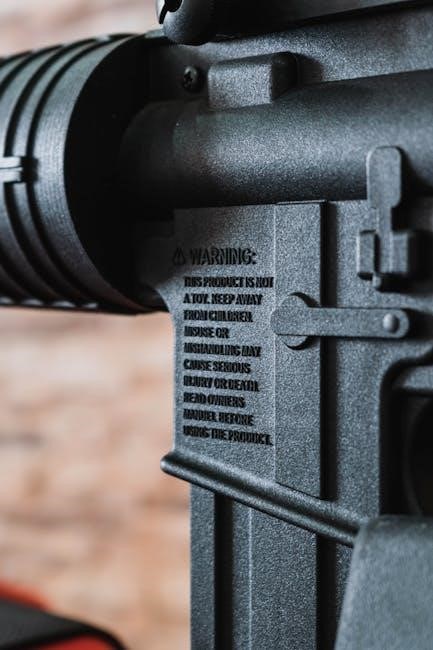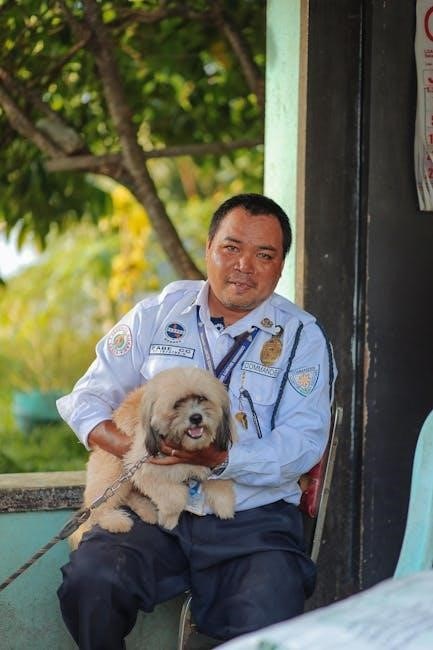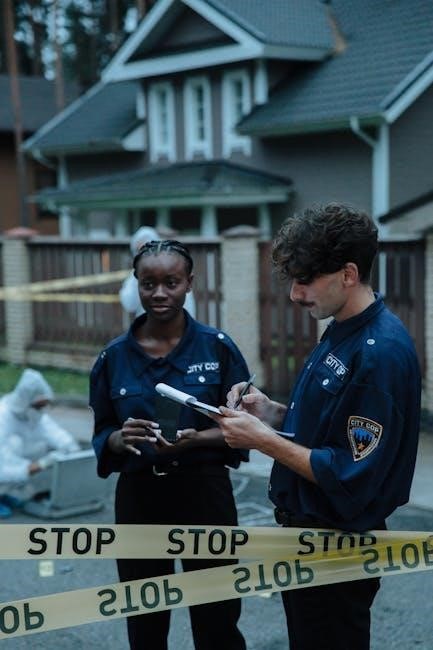
security guard responsibilities pdf
Security guards play a crucial role in ensuring safety and security by maintaining vigilance, professionalism, and protecting property and people from potential threats and hazards.

1.1 Importance of Security Guards in Ensuring Safety and Security
Security guards are essential for preventing threats, ensuring safety, and maintaining order in various environments. Their presence deters potential risks, such as theft, vandalism, and unauthorized access, protecting both people and property.
By monitoring entry points, patrolling premises, and utilizing surveillance equipment, security guards play a critical role in early threat detection and response. Their professionalism and vigilance contribute to creating a secure and trustworthy atmosphere, making them indispensable in safeguarding lives and assets.
1.2 Overview of Key Duties and Expectations
Security guards are tasked with enforcing safety protocols, monitoring access, and responding to emergencies. Their responsibilities include patrolling premises, inspecting equipment, and maintaining incident reports.
They must remain vigilant, handle confidential information with care, and interact professionally with the public. Guards are also expected to adhere to legal standards and maintain a visible presence to deter threats and ensure a secure environment.

Maintaining Safety and Security
Security guards ensure safety by patrolling premises, monitoring equipment, and preventing incidents to secure property and personnel effectively. They are vital in upholding security protocols and safeguarding assets against potential threats and risks.
2.1 Patrolling Premises to Prevent Threats
Security guards conduct regular patrols to identify and mitigate potential threats, ensuring the premises remain secure. Through continuous surveillance, they deter unauthorized access, vandalism, and theft, maintaining a visible presence to enhance safety for everyone on-site. Their patrols include inspecting access points, monitoring equipment, and promptly addressing irregularities, which are critical in preventing incidents before they escalate. Effective patrolling is essential for safeguarding both property and individuals, ensuring a safe environment. Guards must be observant, reporting any suspicious activities to prevent breaches and maintain overall security. Their role in proactive threat prevention is indispensable, making them a cornerstone of safety measures in various settings.
2.2 Monitoring Surveillance Equipment for Early Detection

Security guards are responsible for continuously monitoring surveillance equipment to detect potential threats early. This involves observing CCTV cameras, alarms, and other security systems to identify suspicious activities or breaches. By closely watching these systems, guards can respond swiftly to incidents, preventing escalation. Monitoring also ensures timely alerts for unauthorized access, theft, or vandalism. Guards must remain vigilant, checking equipment regularly to ensure it functions properly and addressing any malfunctions. Accurate observation and prompt action are critical in maintaining security and safeguarding premises. This proactive approach allows guards to address issues before they develop into serious threats, ensuring a safe environment for everyone. Effective monitoring is a cornerstone of modern security strategies, enhancing overall safety measures.
Emergency Response and Crisis Management
Security guards must respond quickly to emergencies, communicate clearly, and coordinate with teams to resolve crises effectively, ensuring safety and minimizing damage in critical situations.
3.1 Responding to Emergencies and Incidents
Security guards must respond promptly and effectively to emergencies, such as fires, medical situations, or breaches of security. Their role involves assessing the situation, securing the area, and providing assistance until professional help arrives. Guards are trained to remain calm under pressure, ensuring the safety of everyone involved. They must also be prepared to administer basic first aid if needed and prevent further escalation of the incident. Effective communication is critical, as guards often serve as the first point of contact during crises. Their actions can significantly impact the outcome, making their ability to respond quickly and decisively invaluable. Proper documentation of incidents is also essential for follow-up and future prevention strategies.
3.2 Communication and Coordination During Critical Situations
Effective communication and coordination are essential for security guards during emergencies. They must clearly convey information to emergency services, staff, and visitors, ensuring a swift and organized response. Guards often act as the central point of contact, coordinating efforts between different parties to maintain order and safety. This includes using radios, phones, or public address systems to provide updates and instructions. Proper communication helps prevent misinformation and ensures that resources are allocated efficiently. Additionally, guards must collaborate with other security personnel, law enforcement, and medical teams to address the situation effectively. Their ability to communicate clearly and remain composed under pressure is crucial for resolving incidents successfully and minimizing risks to people and property. Strong coordination skills are vital to ensure a unified and effective response during critical situations.

Professional Conduct and Public Interaction
Security guards must maintain professionalism, respecting privacy and handling confidential information discreetly, while interacting courteously with the public to ensure a safe and respectful environment for all.
4.1 Projecting Professionalism in Daily Duties
Security guards must maintain a high level of professionalism in their daily duties, ensuring they present themselves as reliable and trustworthy figures. This includes adhering to dress codes, being punctual, and conducting themselves with integrity. Professionalism also involves clear communication, whether through verbal interactions or written reports, ensuring accuracy and clarity. Guards should approach every situation with a composed and respectful demeanor, avoiding any behavior that could compromise their credibility. By upholding these standards, they contribute to a safe and orderly environment, fostering trust among clients, employees, and visitors. Professionalism is not just a duty but a critical aspect of their role in safeguarding people and property effectively.
4.2 Handling Confidential Information and Respect for Privacy
Security guards often encounter sensitive or confidential information while performing their duties, making it essential to handle such data with utmost discretion; Whether it involves personal details of individuals, proprietary company information, or incident reports, guards must ensure confidentiality is maintained. Respecting privacy is equally critical, particularly when interacting with individuals or monitoring private areas. Guards should avoid unauthorized disclosure of information and refrain from invasive practices unless legally justified. Breaching confidentiality or privacy can lead to legal consequences and damage to trust. Therefore, security personnel must adhere to ethical standards, respect privacy rights, and only access information necessary for their duties. This ensures the integrity of their role and upholds the principles of professionalism and accountability. Guards must also be aware of legal requirements regarding data protection and privacy laws to avoid violations. By maintaining confidentiality and respecting privacy, security guards contribute to a secure and trustworthy environment for all stakeholders, including clients, employees, and visitors. This not only enhances their credibility but also reinforces the overall safety and security framework they are responsible for maintaining.
Documentation and Compliance
Documentation and compliance are critical for security guards, ensuring accountability and adherence to legal standards. Accurate records and reports help in legal proceedings and enhancing security protocols effectively.
5.1 Report Writing and Incident Logging
Report writing and incident logging are essential skills for security guards, ensuring accurate documentation of events, incidents, and observations. These records serve as legal evidence and help in investigations, providing a clear understanding of what occurred. Security guards must maintain detailed logs of patrols, suspicious activities, and any incidents they encounter. Effective report writing requires attention to detail, clarity, and precision to avoid ambiguity. Incident logs should include dates, times, locations, and descriptions of events, as well as the actions taken by the guard. Proper documentation helps in identifying patterns, improving security protocols, and ensuring accountability. It also aids in training and decision-making, making it a critical component of a security guard’s responsibilities. Accurate and timely documentation is vital for maintaining professionalism and legal compliance.
5.2 Adherence to Legal and Regulatory Requirements
Security guards must strictly adhere to legal and regulatory requirements to ensure lawful operations and avoid liability. This includes understanding local, state, and federal laws governing security practices, such as arrest procedures, search protocols, and use of force. Guards must comply with industry-specific regulations, particularly in sensitive environments like construction sites, schools, or government facilities. Knowledge of privacy laws is crucial to avoid violations during surveillance or data handling. Additionally, guards must stay updated on changing legal standards and obtain necessary certifications. Adherence to these requirements not only protects individuals and property but also maintains the integrity of the security organization. Proper training and awareness programs are essential to ensure guards operate within legal boundaries, fostering trust and professionalism in their roles. Legal compliance is a fundamental aspect of a security guard’s duties;